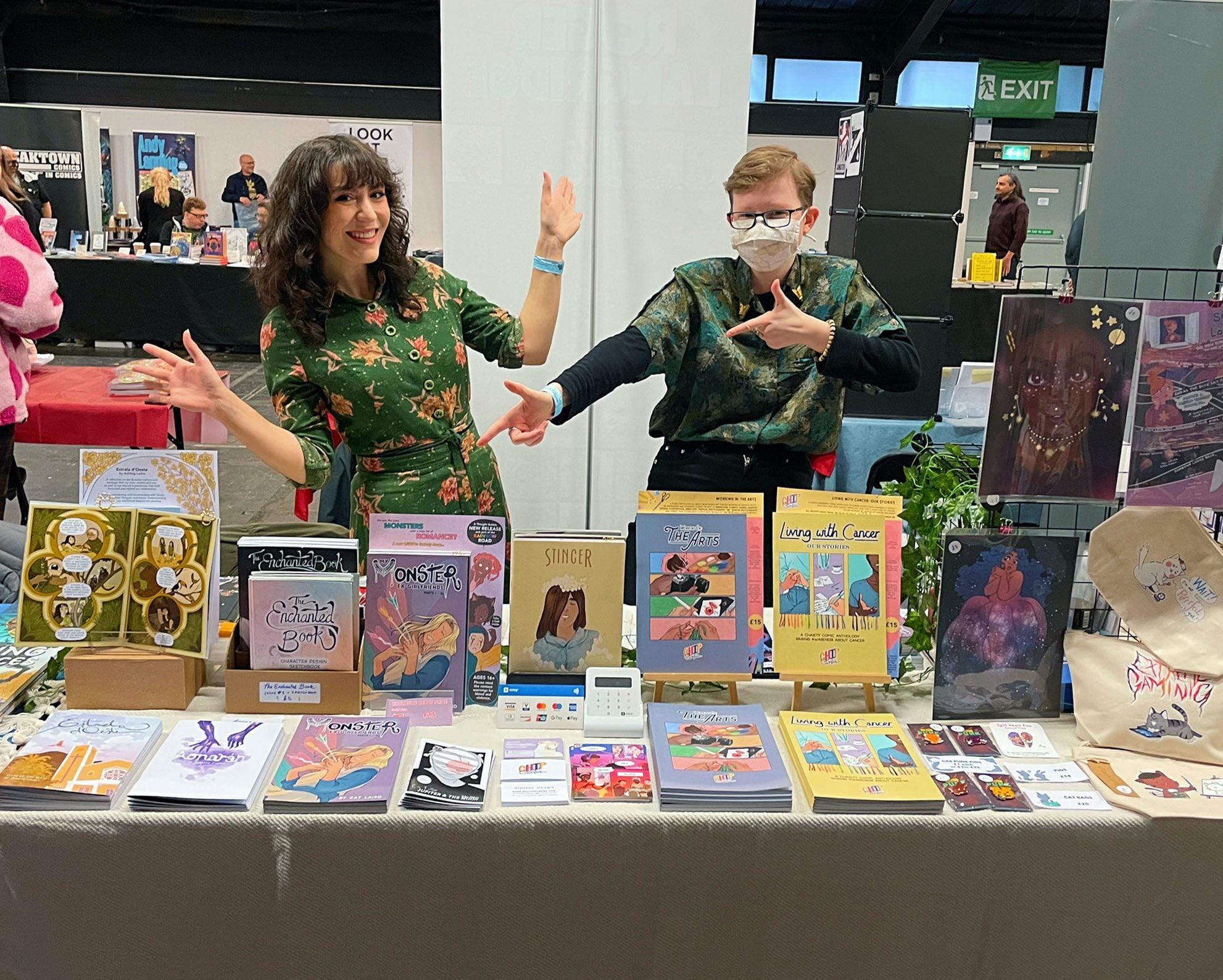
25.04.23

Often, these projects sit on a foundation of an individual’s particular passion for their chosen creative field but end up providing more benefit to the broader community than was ever expected.
This time around, we’re speaking to Cat Laird and Ashling Larkin, co-founders of CHIP Collective. CHIP – which stands for “Comics Help Inform People” – create informative graphic novels that raise awareness about varied subjects not typically covered in comics, bringing these stories to as wide an audience as possible. We chatted about handling sensitive topics with kindness and consideration, the pitfalls of crowdfunding, and bringing a new genre of comics to Dundee.
Creative Dundee: Tell us a little bit about how CHIP Collective came to be!
Cat Laird: So we got to know each other originally because we were in the same studio at Dundee Comics Creative Space – we sat next to each other, started having lunch together and it just went from there. We kind of knew at that point what it was like working individually as creatives, making comics, and we’d worked on a lot of the same comic anthologies together, but we were seeing the same pitfalls of people not getting paid enough, or the time schedules can be really tight. I think people outside of comics don’t necessarily understand the whole pipeline and that it takes longer to get to a finished product. So CHIP was born from that frustration. We were like: “Why don’t we just be the middlemen?” We know how this works, we can pitch in with the work so we still get the chance to get something creative out of it too.
Ashling Larkin: The first project that we did was Living with Cancer: Our Stories, which is a cancer awareness comic that was sparked by my mum’s diagnosis of cancer and the frustration I’d felt about not having accessible information when I needed it. And then during the pandemic, I guess similarly built from our frustrations about how things were in the world, particularly for creatives, we created Working In: The Arts. It was the sort of creative collaboration between ourselves and a bunch of other artists demystifying and showing just how many different creative fields there are and how there’s not a right or wrong way to enter into them.
CL: It gives us a chance to work on projects we care about and, during the pandemic, it gave us a way to support fellow artists, both with a project to occupy time, but also being able to monetarily give them something as well. These things just feel like people should be doing them and we know what we’re doing with our field, so we kind of feel like why not?
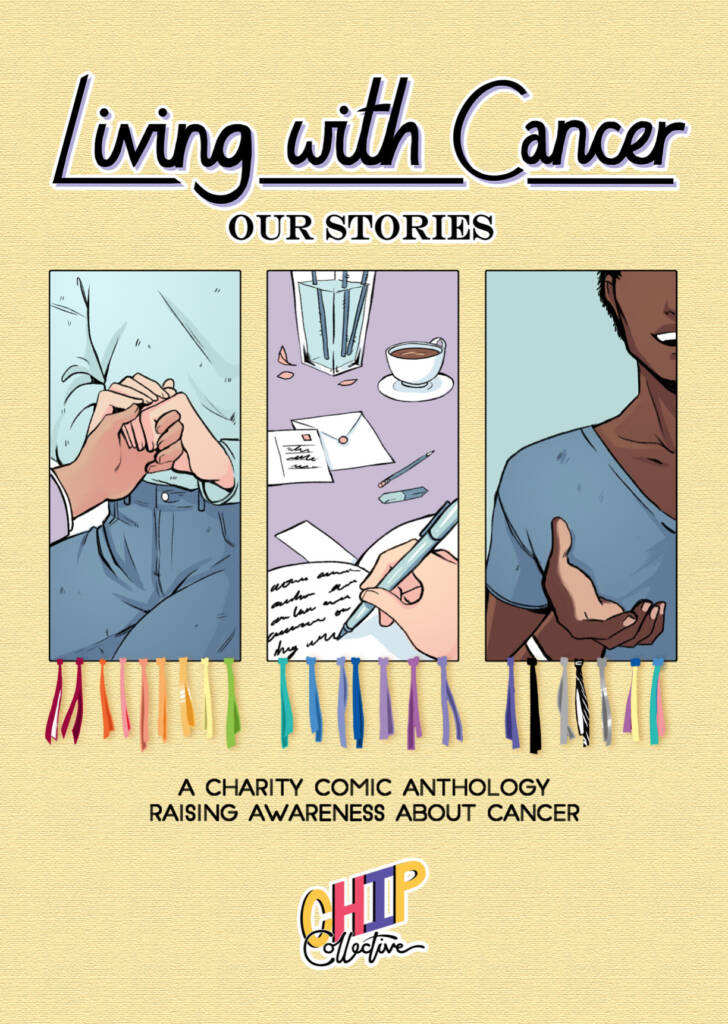
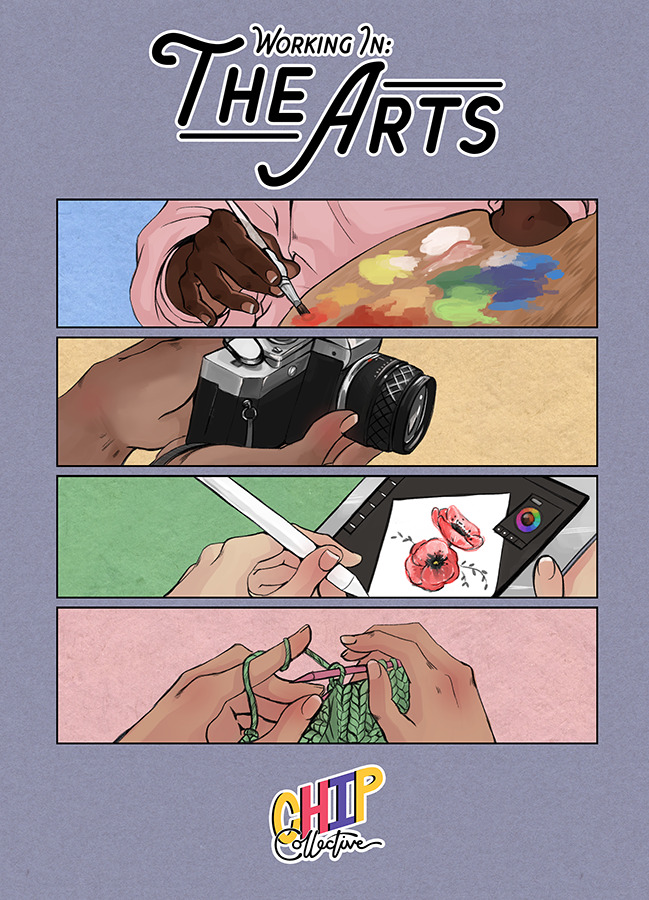
CD: You make informative comics, but the stories the comics tell are really personal, based on life experiences. What made this what you want to focus on?
AL: Cat and I both had experience working in information comics, and for me personally, I have a lot of experience specifically creating autobiographical works. Throughout my time at DJCAD, I created an autobiographical comic called Fundee about being an animation student and I was able to recognize the therapeutic aspects of being able to sort of put yourself in your work, quite literally. That was something that is reflected in CHIP Collective, particularly in the cancer awareness comic, where it gave people that space and opportunity to share their personal stories in a way that they were happy with.
CL: I think with that one, because we’d done a lot of graphical medicine work before too, we understood that it’s a sensitive topic that needs to be handled well. A lot of medical info out there, it’s very graphic – it can be very jarring and triggering. But I think comics can create a space between you and reality. For the people whose story it is, it gives them a sort of disconnect between them vs. an illustration of themselves and their words combined. It gives that little bit of safety, whilst also giving whoever’s reading it the ability to put themselves in the drawing. If you see a photo of someone, that’s a specific person but if you see a drawing of someone, it’s like, oh there’s a possibility that that’s me.
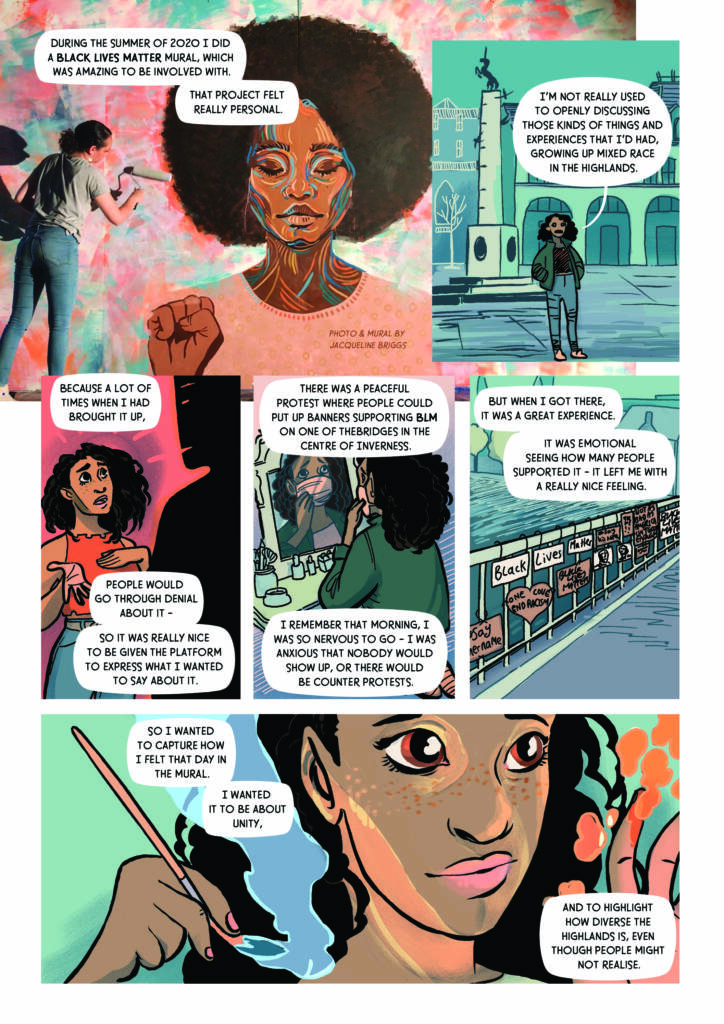
CD: What does the process of translating these stories into comics look like?
CL: When we interview people about their experiences, we record them, make transcripts and from that we distil their stories down into a script our artists can use. But it’s important to make sure the original voices don’t get lost, so we try to keep as many quotes from them intact as possible, so they can still hear their voice in it.
AL: To really encourage whoever we’re interviewing and make them feel like they’re part of the creative process, we also ask them if they have a favourite colour, a series of favourite colours, a particular art style that they like, particular hobbies or things they do. That’s part of what we use to match up the artists with them. Our focus is less on making all the different art styles work together and more about if the style of the artist matches the story that they’re telling.
CL: We made sure to have check-ins at each stage, to make sure they were happy with how the artwork was progressing, and made sure our communication was open so that if anybody had any questions or wanted to make adjustments at any time they could ask for them. We took the same care with Working In: The Arts, which is obviously not as sensitive a topic but people have all sorts of different roads to getting to where they are and that’s deeply personal. We were asking other creatives to entrust us to tell that story, to hand over their self expression to someone else.
AL: We try to be really kind with time for the artists too. Make sure they’ve got enough time to hit deadlines; making sure we’ve got enough time built in so we can be flexible about time too. Life happens and if they need to extend the deadline, we want to make sure we’ve accounted for that.
CL: Yeah, taking time is a really important factor in all of it. With projects like these, I think just slowing down the pace a little bit, making sure you’ve got the time to check in with people, checking on whether they’re okay, it really does make so much more out of a project. Everyone was super satisfied with how their comics all turned out and that extra care just made for a better quality product, one that just had so much heart in it.
CD: It sounds like you’ve consciously built a really open, collaborative way of working.
CL: We’re hoping that CHIP is a bit of an umbrella where people can meet and work on the same projects, that if anything else comes up in future and somebody needs some support, we can be there. I think, at the end of the day, everyone who does work with us becomes a part of the collective. It’s not just the two of us.
AL: Yeah, we’re all CHIPs!
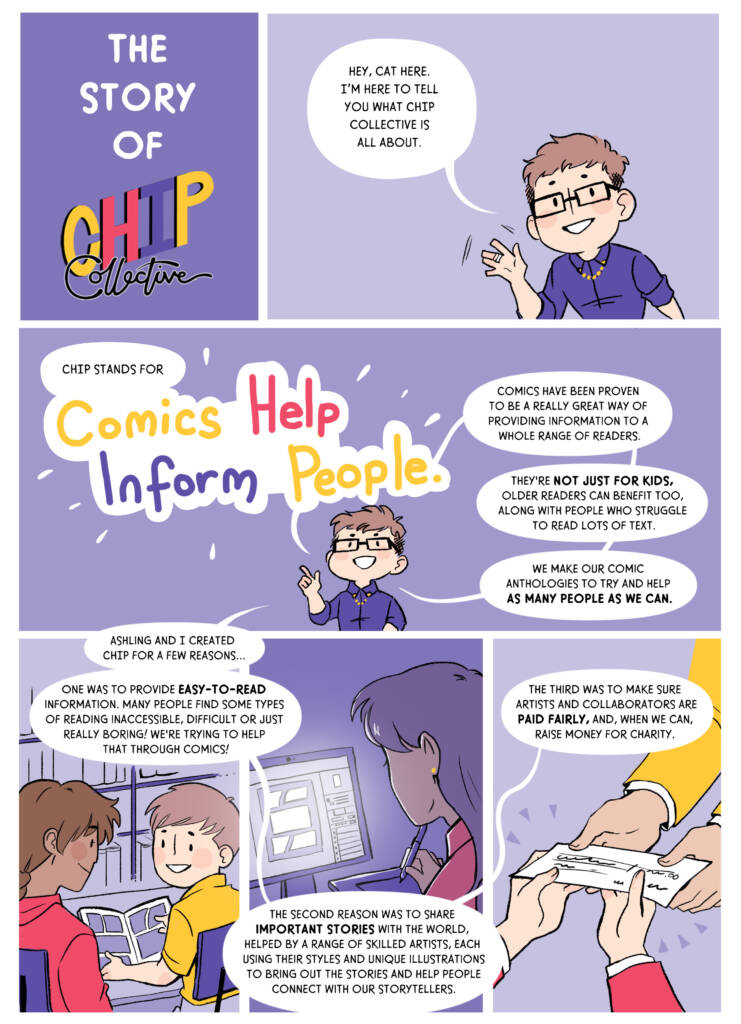
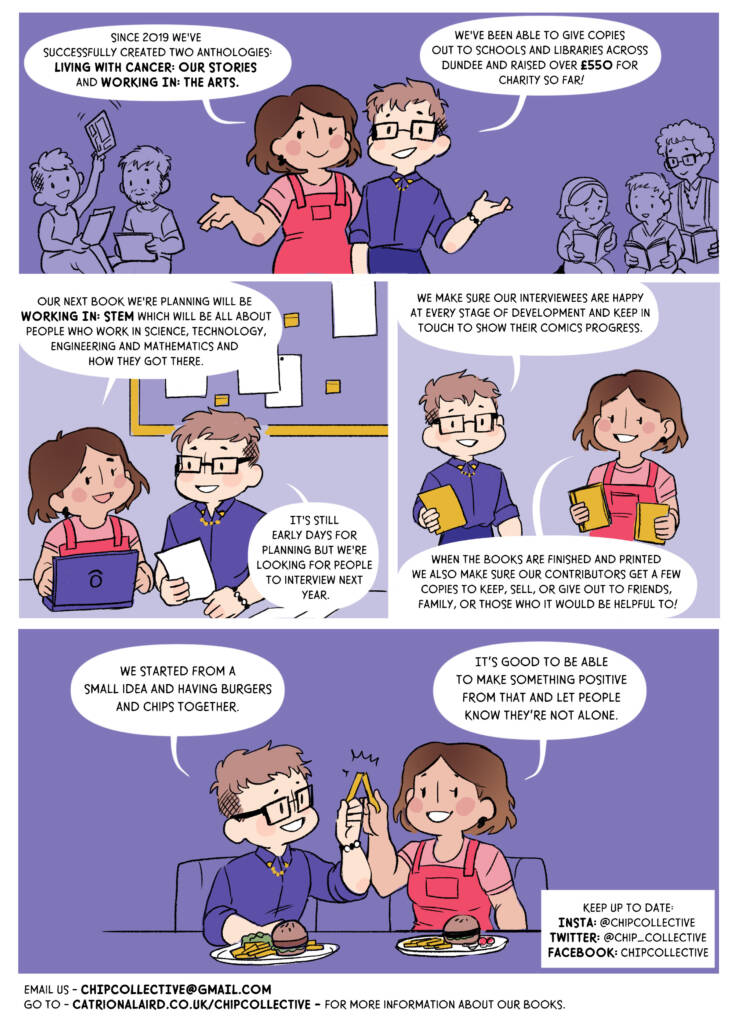
CD: You started working together in a physical space, but you now do everything remotely. Did that change how you were working at all?
CD: In a way, it’s quite nice. It gives us even more of a reason to reach out to other people across Scotland and work with them, and also work with people who aren’t able bodied or couldn’t work in the studio like that. If they’ve got a set up at home and they can produce the work and we can chat to them, that’s all we need. I guess it’s just a product of how the world’s changed really.
AL: Even before the pandemic, all the artists we were working with were just working at their own home spaces. Having to be physically in the presence of each other and also collaborators hasn’t really been a necessity for us to create the work so that’s been good.
CL: Yeah, the studio at Dundee Comics Creative Space was a really good jumping off point for us as graduates. I think we got a lot out of it whilst it was there. But now, working remotely, it means that when we do meet up, it’s more about having a fun time together. During the pandemic we obviously couldn’t meet up in person, but we took time to play Gartic Phone, which is basically an online space where we could play drawing games together with a lot of our creators. We got the artists and non-artists together to do that and it was super, super fun and even though it wasn’t a physical meetup, it kind of felt like we were all in the same room together. In Working In: The Arts, we actually had a lot of Orcadian’s meet that hadn’t met before despite living on the same island for an extended period of time, and now I still see them interacting with each other on my timeline and I’m like “We did that!”. You know, you can’t substitute with meeting up with people in real life, there’s always gonna be a benefit to that but I think knowing that you can make a comfortable working space for yourself – and that it can be at home – makes a difference. Just remember to go outside every now and again, touch grass, speak to human people, that’s what you really need.
CD: Comics are a medium that’s synonymous with Dundee, but what you’re making is quite different from what people might automatically think of as comics. How have people reacted to your work?
CL: Because comics are traditionally known as being for kids, people do tend to initially think “ah, Beano, Dandy!” and you have to take time to explain like no, it’s actually different, it’s more than that.
AL: With Living with Cancer: Our Stories specifically, there are a lot of interesting reactions. There’s a lot of reaction like “Oh! This is a bit dark, isn’t it!?” and it’s like no, the whole point of this is that it’s uplifting, that it’s providing hope and information, that it’s a useful tool. On the flip side, there are a lot of people that react very positively to it. I think people who have experienced cancer themselves, whether it’s their diagnosis or a loved one’s, really see the value in it and want to support it. We’ve been told “I wish I had something like this when I was going through it” and that’s been really encouraging.
CL: There’s one interaction that I’m thinking about from last year where a guy came over to the table [when tabling at a comic convention last year] and picked up Living with Cancer and was like “Oh, this isn’t suitable for kids, is it?” and I was like “Well yeah actually, it is!”. It mentions death because, unfortunately, it can happen, but it does so in a way that’s not overblowing that part. It’s about the living part. When we explained, he was really taken with it. He was a primary school teacher and I think he ended up buying a copy so that he could take it into his school. I think we get a lot of people like that who are a little bit worried about it at face value but one of the things that we wanted to tackle was making cancer more of a topic that people could just talk about. Once we get a chance to explain it, I think most people are on board.
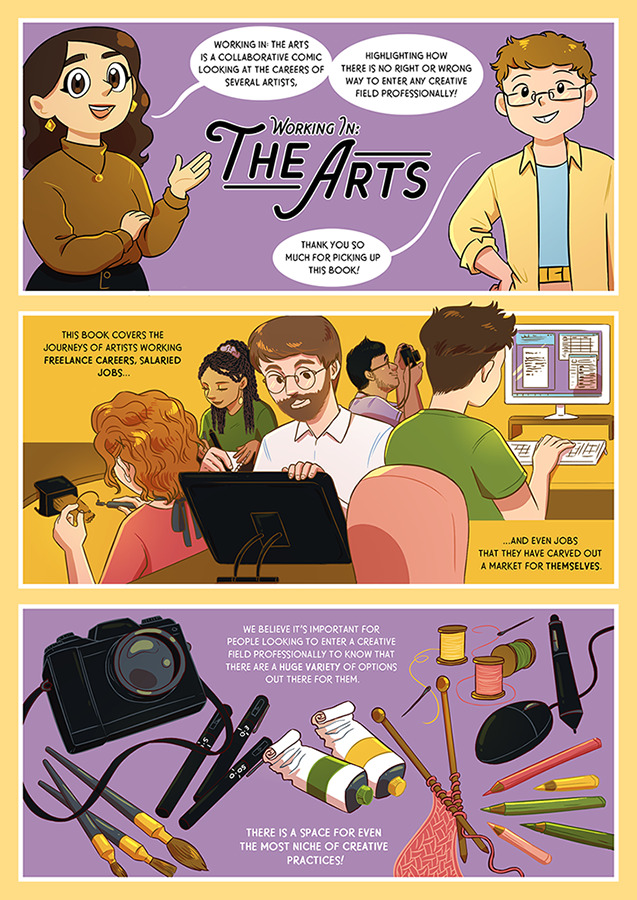
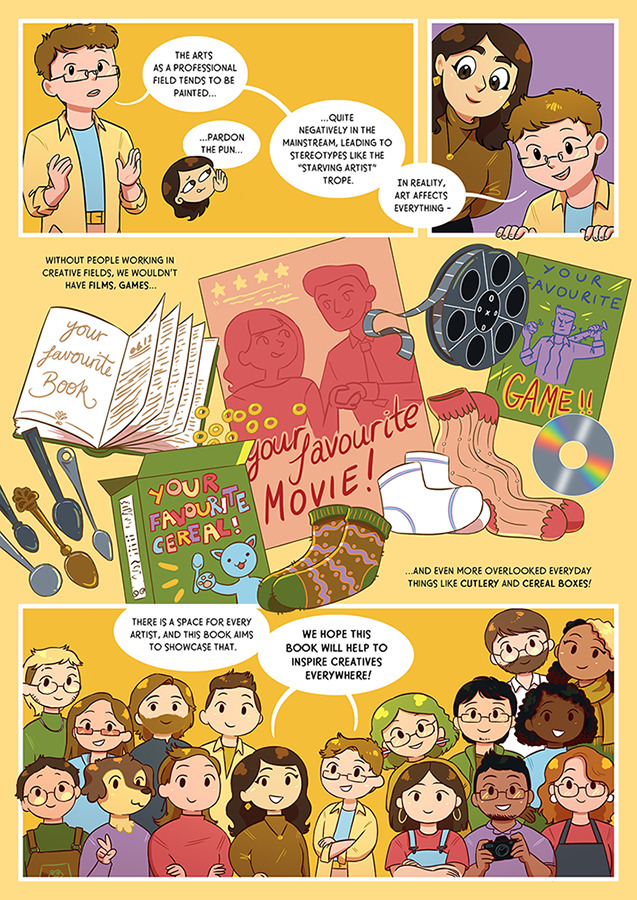
CD: If it’s okay with you, I’d love to talk a little bit about funding. You’ve used crowdfunding to finance your two publications so far – how have you found it?
AL: It’s quite stressful!
CL: Yeah, for that whole month you’re like refreshing the same page over and over again. You’ve got to hit your target and then you’re hoping to get more than that, so you can do more. The first couple of days are where the majority of the money comes in, and then it’s stagnant for a long long time.
AL: That’s the worst part.
CL: And then it comes to the end and everyone rushes again! As a funding model, I feel like the longevity of having to go through that over and over would really get to us eventually. But funding is so difficult to come by, and just finding opportunities for it is really tricky, especially for the nature of our projects. We’re already kind of in a niche in comics and then the fact that our project is informative. We’re sort of plugging along but CHIP is something that can’t take priority in our work-life because it’s just not sustainable for us to sit and work on that constantly. It takes a backburner until an opportunity arises and then it’s all systems go.
AL: Yeah, it is a big reason why there have been quite large gaps of time in between our projects, because we do have like a whole list of projects that we really want to do but it’s just about the funding and prioritising our time and ability.
CD: In an ideal world, would you both be working on CHIP full time?
AL: I mean, I lecture at the University of Dundee too and I love my work there, so if I could do this and that and be compensated for both that would be ideal for me.
CL: Yeah, I’m kind of the same. I love CHIP, but it is quite hard going. I think if it was full-time work, I would just end up in an admin role which is not what I want to do. I’d probably be like “I’m running away forever now to make my own comics!”. I quite like having a balance between being able to do my freelance stuff, which is made up of smaller projects, and having this as well which I can focus on for six, eight months at a time and sort of build up the catalogue slowly.
AL: It’s nice to have a creative outlet as well that’s not specifically art related, too. Like Cat and I write the scripts and that in itself is a nice creative thing without, I don’t know, I don’t want to say the pressures of drawing but… I don’t know if that makes sense to you, Cat?
CL: Yeah, no it does. We provide a springboard for someone else to then go off and be super creative but we also get to feel the benefits without having to do that physical work. You get this moment of being like “Oh my god, this is beautiful and amazing and I didn’t have to do it!”. CHIP provides a bit of variety to just freelance work, and I just really like having something different to do from day to day.
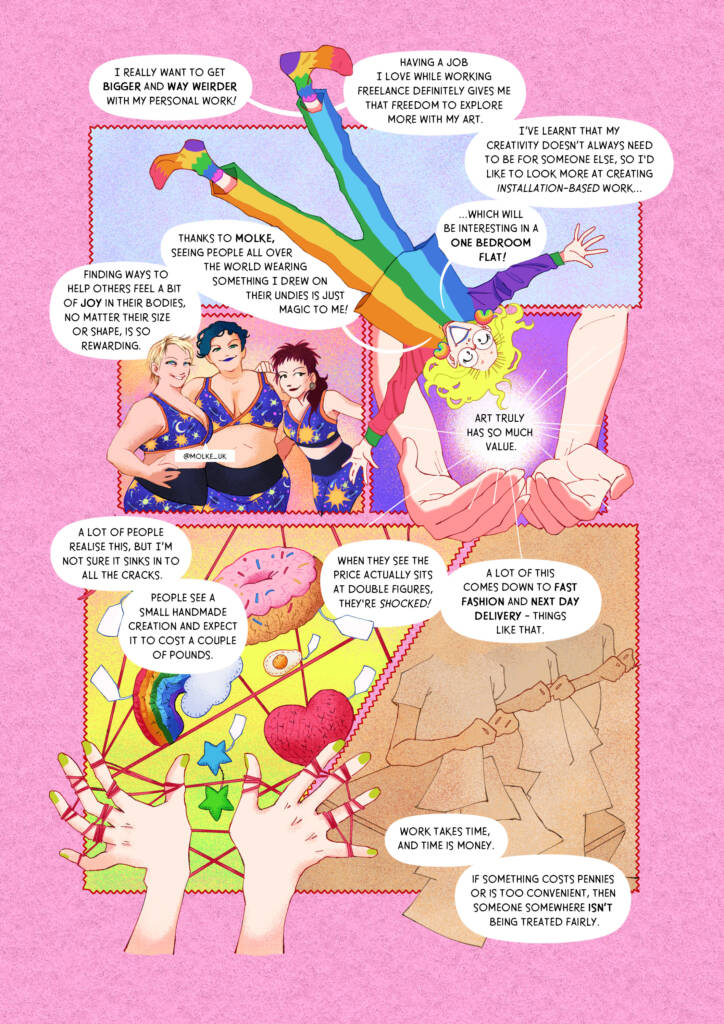
CD: So what’s next in the plans for CHIP?
AL: The next project that we’re going to be working on is a sort of marriage between the two that we’ve already done, under the title Working In: STEM. We’ll be talking to people who are working in different fields across science, technology, engineering and maths and sort of having that approach of there not being a right or wrong way to get into these different fields and giving information about how to actually enter those fields. So I think that’ll be really fun, really interesting.
CL: It’s a super important topic, we’ve seen that over the last few years with the pandemic, people needing vaccines and this all needing a lot of manpower. A lot of people who are in science and technology literally save people’s lives. We’ve got a global warming crisis, and statistics is a huge thing that’s come up recently too. It’s just super important. But we need to have the money to do it, so we need to build up some support over the next wee while, see what opportunities are around and see who’s interested in helping us out.
CD: Is there anything that you would love to see happening in the city around comics? Anything that would support CHIP Collective, beyond funding?
AL: I mean, I think the Comics Creative Space [currently in the process of moving, but planning to open again soon] was a really positive thing to have in Dundee. I think a physical space that’s either free or affordable for people working creatively, professionally, maybe just casually, something that’s open to anyone would be really good.
CL: For me, there are so many new and interesting comics that come out every year from the University, and I feel like I can never go and read them. I’m either away for the degree show or I’m not around to go and read things, or I’m busy and by the time I’m available, it’s over. I just feel like there should be a physical hub that’s got a collection of them so people can go in and read them, and borrow them. And also just a space to talk to people about comics and not have it necessarily linked to being academic. We are very lucky that we’ve got a strong academic base for comics here, but I feel like when you’re out of academia unless you’re working for the university or you’re intrinsically tied to it in some way, connections can fade. People move away and you’ve lost the link to each other. I think it’d be really nice if we had somewhere that was more of a social space and some place to bond and create and give you the opportunity to network. I think that will help to alleviate some of the misconceptions about comics as well, because if anyone can just walk into it, it’s more accessible. When we had Beanotown, there were panels and workshops running within the Gather space in the Overgate [currently on hiatus] and I thought that was such a nice space to have it in, because there was a lot of the general public going past and not really knowing what they were looking, at but coming in to find out. So yeah, I think more stuff like that, that was permanent – or even if it was seasonal – would be great.

If you would like to support us in creating even better content, please consider joining or supporting our Amps Community.